The Ghost in the Machine: The Prophecies of AI
I've been going down a bit of a rabbit hole today.
I've never really been that big into philosophy. I feel I'm a pretty philosophical person, but I like to draw my own conclusions from my own experiences, rather than read up on other people's views and arguments.
You'd be surprised at how similar the everyday thoughts can line up with philosophers treasured and immortalised over the centuries for saying the same basic premises but in more formal, convoluted language.
But there are some things that we rarely think about on any deep level, most of us simply lack the time of day. They pop up often in the lyrics of music, the synopsis of a show or movie, or games.
Even tacky movies like something from Marvel touch upon philosophical ideas, even if by accident 'what does it mean to be human?' 'Are we born good or evil?'.
Well, after some bouncing around and getting teary eyed at some beautiful Anime music, the OST from the 1995 movie Ghost in the Shell and its sequel, I started reminiscing about the show and re-pondering its philosophical implications.
Before I go on, I really suggest listening to this song. Nobody has patience for the music that made me teary-eyed, but this is still pretty amazing.
There is a surprising amount of anime that provokes a lot of deeper thought, but Ghost in the Shell is perhaps more famous for it.
The basic premise is a dystopian future of... 2029 (lol), in which Cybernetics has become the cultural norm, and AI has become a fully fledged force.
Humans are casually swapping out organs and other body parts to enhance themselves, leaving the 'Ghost' - the mind or soul - in the 'Shell' - the cybernetic body that replaces the original.
There exists the process of ghost dubbing, where one replicates the ghost artificially, but it is never a perfect replica, and the original dies in the process.
A notorious drug lord took advantage of this by having himself completely replicated upon his death, providing the world with practically infinite copies of himself, making him functionally infinite (though inferior).
The protagonist herself, if I remember right (it's been many many years), battled with this idea of transferring into a complete artificial body.
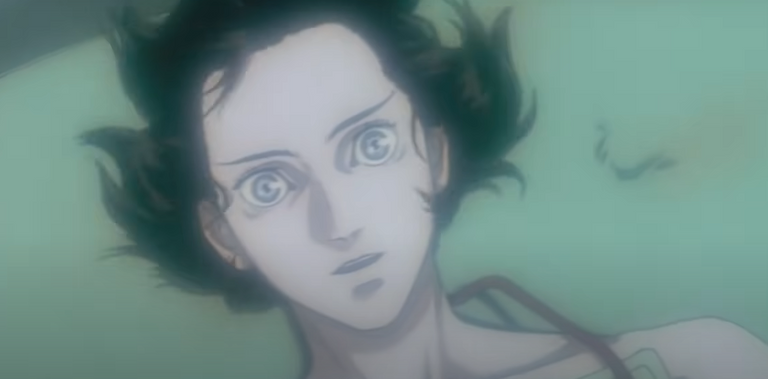
The idea, philosophically, is nothing new and in fact a persistent conundrum. In Star Trek, teleportation calls into question whether you are murdering everybody who ever uses it, and simply replicating a new, identical version of them at the new destination, memories in tact and all.
It's possible in that universe, that people are being murdered by the millions every single day, and perhaps no original humans even exist anymore. All replicas. After all, the idea of collecting every single atom and somehow transporting those elsewhere and re-combining them as they were... seems far fetched even by sci-fi fantasy standards.
But, atoms are identical. An atom is an atom. A hydrogen atom is identical to another. So perhaps two are being created, and both are legitimately two versions both with a real, but shared, history? They just murder one in the process, perhaps.
Well, philosophically, this idea of 'self' is addressed in Descartes Dualism.
Cartesian Dualism
In short, 'I think therefore I am'.
The physical is one thing, the mind is another. Both are completely separate, as one takes up physical space while the other does not.
Descartes realised he could doubt the existence of pretty much everything, including his own physical self - Think The Matrix, or simulation hypothesis, that we are already in a simulation of some superior beings invention - also addressed in Rick & Morty.
Perhaps our body, and everything physical around us is not real, but a digital manifestation or a Godly illusion. It is easy to doubt. But the act of doubting seems to prove that your mine cannot be doubted, because in order to doubt, you have to think, and to think requires a mind.
Ergo, I think, therefore I am; Cogito, Ergo Sum.
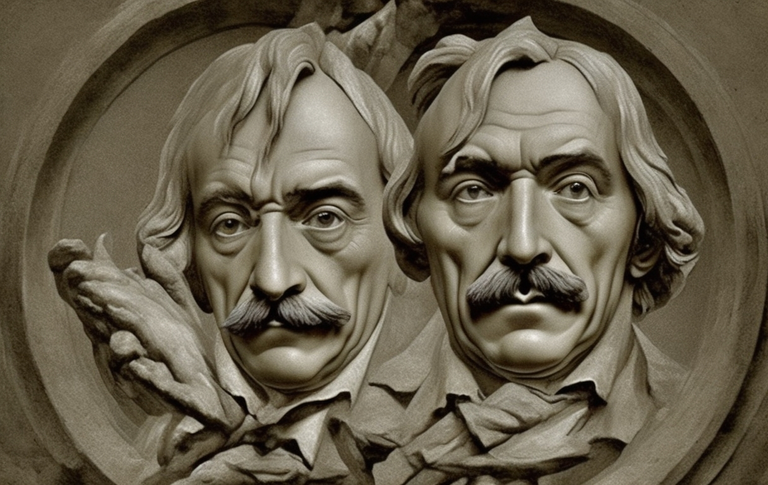
Ghost in the Shell itself is a title based on Gilbert Ryle's Concept of Mind, a work that criticizes and even mocks Descartes idea of Dualism in which he coins the term 'Ghost in the Machine'.
In essence, he points out the common sense thought that, although Descartes suggests the non-physical mind is private and inaccessible (unless you tell people about your dreams, etc), our everyday experience is quite different; when one winces in pain, that is an act from our mind physically manifesting in our body. An observer needs no special training and investigation into the secret hidden thoughts to know what that wince meant. The same applies to much (not all) of our inner thoughts.
Gilbert suggests that there is a physical manifestation of the mind within the brain, and Ghost in the Shell describes the Ghost more broadly as something inevitable when sufficient complexity arises; AI may have as much of a ghost as any human.
For me, I don't personally line up with Descartes concept for a few other reasons. When I am thinking, there seems to be a physical location of those thoughts, somewhere in my head, certainly, I guess between and above my eyes.
Also, I'm pretty confident as an atheist that when we die, the ghost dies with us. Religious folk are proponents of Dualism, but not I.
The idea of swapping one's body parts out as they do in Ghost in the Shell is reminiscent of the Greek paradox, Ship of Theseus, which raises the question about whether or not a ship is still the original ship if you replace, one part of the ship each year for a thousand years until it is entirely replaced.
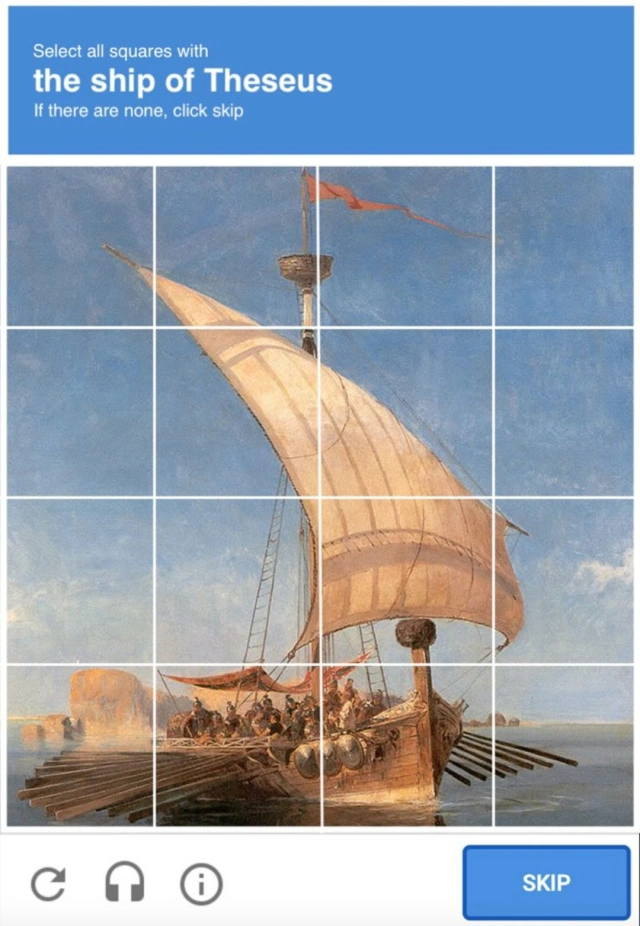
Even the famous English comedy Only Fools & Horses touches on this idea, with a broom:
I've had the same broom for the last 20 years. She was very impressed and said 'have a medal'...
...This old broom has had 17 new heads and 14 new handles in its time
If one replaces tiny parts of the brain with identical yet artificial equivalents, at which point does the brain lose its ghost, and instead be considered, artificial? The thoughts, experiences and memories are identical, but the original broom and handle got tossed years ago.
Birth
Much like Star Trek's Teleportation conundrum, Ghost in the Shell concerns itself with the idea that a complete copy may or may not be the original, depending how you think about it. In one narrative device, two 'beings' combine, not to form a combination, per se, but the birth of a third, similar but not identical to either of the previous separate entities.
Kind of like biological conception.
This is also in Star Trek Deep Space Nine, where the character Dax, a kind of slug leech thing, lives as a consensual parasite in humanoid bodies in order to create a being who is not the humanoid nor the slug, but a third entity with the previous memories of previous hosts intact, combined with the new host's experiences, thus altering one's personality to something unique.
Cyber-brain warfare, a thing to look forward to?
As your brain gets slowly replaced by artificial elements, the likelihood of being hacked rises. And Ghost-hacking is also addressed in Ghost in the Shell. Hackers are able to manipulate your sensory information, block or alter memories, and more.
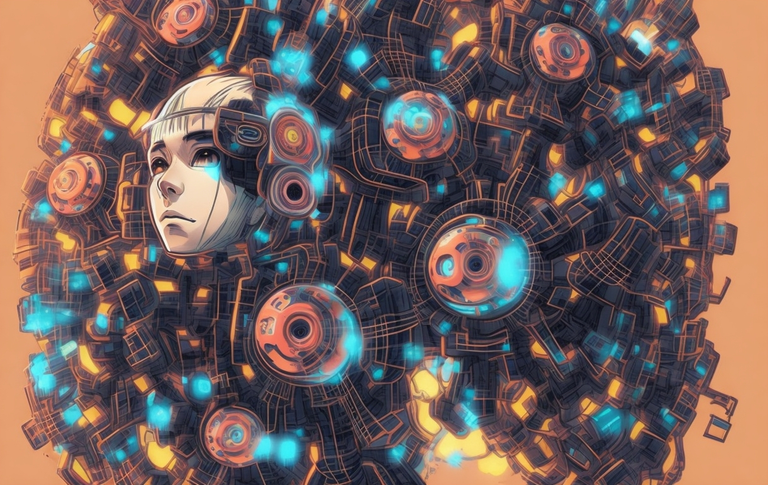
If you commit a crime and the authorities discover such a defect, the consequence is a simple repair and release.
However, if you - your ghost - is held responsible itself, you get a lobotomy, de-ghosted. Thus, unable to repeat such a crime.
One natural solution to being cyber-hacked or lobotomized is the idea of, well, a kind of offline wallet a la cryptocurrency, where your OG brain is safely stored away from the dangers of the network.
In this way, we get a completely new concept of Descartes dualism, in which the mind is indeed separate, on a hard drive.
Coming soon?
I do wonder how far we are going to go. Ghost in the Shell addresses concerns that are almost timeless in their access to future problems. AI is a major concern at the moment for taking ahhr jahhbbs, but it is far from the level of taking our bodies and minds. But will that always be the case?
Again this show is set in 2029 so I guess we only have to wait 6 years to find out!
That being said, the show could be extremely prophetic, with such fiction unravelling as reality over many centuries to come.
But, as it suggests with its terrible date predictions, it's unlikely to be anything significant in our lifetimes. If you think in the 1990's that 2029 was the time when cybernetic organisms are the casual norm, then you're gonna be pretty disappointed when Bladerunner 2049 comes to pass 26 years from now XD.
More likely, by 2050, we will be complaining about how we shouldn't have Ronald Gump in power when he's a 94-year-old nincompoop when a 1-bedroom box sells for $18,000,000. But at least Putin's son is finally in constructive talks with Zelensky about a ceasefire.
Where's the fun in all that?
Often people say you shouldn't find a career in your passion because it'll sap all the enjoyment out of it. That may be true for some, but I never found my career in music sapped any enjoyment out of music for me, at any point. If anything it deepened my appreciation of it.
Likewise, delving deep into the philosophy of an old anime and other shows grows my appreciation of it. It's not like I'm pausing the show every 17 seconds to have a discussion on the societal implications raised in this particular scene. I feel the issues through the narrative in real time, and digging through after or before the fact only enhances that felt experience.
I fully intend to watch the 1995 and 2004 sequel in the coming weeks with all the above in mind, and see what else I can grasp from its many, many layers. I'd recommend it to you, too! (Pretty sure they're both available in full on YouTube).
At least watch the AMV above.
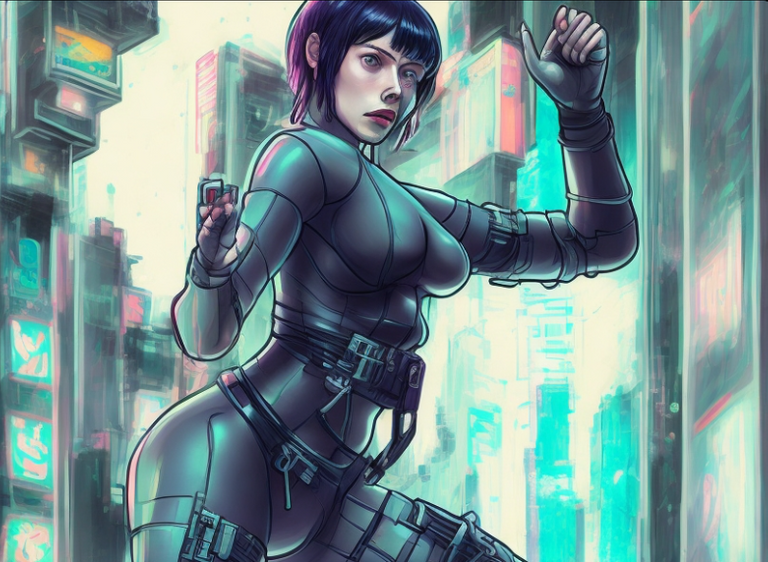
I don't read philosophers either - however, perhaps it is an alignment based on their observations over the years as well.
I have heard that people on LSD might argue this, as that location can be lost.
It is already replacing us mentally in many respects and changing the way we behave. Aren't we getting hacked when we follow suggestion to act differently? Our code is being altered to get a different outcome and, it is being done quite systematically. Perhaps we are robots already, at least we are cyborgs, since a lot of our memory is held outside of our natural body now.
I like this interpretation. I'm intrigued by the future concept of us simply being biological machines that succumb to the same things. I mean, we did call computer viruses 'viruses' for a reason.
Robots, or perhaps zombies, from the drugs in the US are pretty terrifying, too. I'd consider those people hacked.
Likely just one of the silly things the brain does on that stuff... worth me digging up some more about 'thinking location', as I recall people in ancient times believing their mind was in their heart's location (the centre of the body). It's possible it's just learned somehow?? Hmm.
I've read enough of your content to know you don't need 'em heh.
Congratulations @mobbs! You have completed the following achievement on the Hive blockchain And have been rewarded with New badge(s)
Your next target is to reach 26000 upvotes.
You can view your badges on your board and compare yourself to others in the Ranking
If you no longer want to receive notifications, reply to this comment with the word
STOPTo support your work, I also upvoted your post!
You know, like you, I resonated with this idea that I'm fundamentally philosophical, but not into philosophy.
Recently, I've taken a philosophy of science class that worked as an elective towards my degree. It was honestly great. There's plenty of poor philosophy out there but certain subtopics are good. Sounds like you may be into the philosophy of mind.
Your empirical views would probably align with David Hume to some degree (mine do).
I've thought deeply about "uploading" my consciousness into a machine. But it's like you said, the process would likely involve making inferences based on neurological structures, and providing some form of representation of this. It really seems like you externally, but likely not you.
This is probably due to the limited perspective bounded to the limitations of human cognition. We considerably simplify everything and represent it symbolically because that's how we make sense of the complexity of the universe. How can we ever get an adequate representation of ourselves if we're only capable of understanding things truly after a great reduction or simplification? Brings you to one of those, "can a mind understand itself" type questions.
Many agree that the prevailing force of the universe is an increasing entropy. They ultimately believe that we'll reach thermodynamic equilibrium through this. This is contradicting in my mind, supreme order built from increasing disorder (randomness). Diffusion is everywhere so this is likely true, but as a thought experiment could it be that we just don't have the capacity or perspective understand this complexity? Is it truly random or extremely predictable from a higher level of perspective and knowledge?
This is all a really long way of saying, hey man, we probably just aren't smart enough to ever realize a true representation of ourselves. It's like attempting to define a word that we all know, but can't pin down. Somehow there's always something uncanny or off about something that is not "real", whatever that means.
Ah yes again, I know the names but not the content to much extent. Will read upon later today!
That's probably right yeah. I remember I read this tacky book my mum got me which touched on an interesting idea similar to what you refer to, that God, all knowing and all powerful, had only one thing left he didn't know: What was it like to not exist.
So he destroyed himself into pieces we call humans on earth who are rebuilding the 'brain' of God, I suppose, in the form of civilisation on a big round rock in space, at which point God will be reborn with the knowledge of not existing.
Seemed silly as I read it, but I do like the struggle we all have with such questions that lead to books like that.
Hume brought on empirical thought. While outdated, he is still brought up a lot when talking about the subject. Read the cliff notes lol.
Probably why i've definitely heard it a lot. Even though I might not go about reading philosophy, I watch a lot of people discuss deeper topics from different perspectives such as psychology, physics, history. They all overlap in certain aspects in the end.
Richard Feynman said you can't understand things unless you can build them that's the real test of do you understand it. And AI can understand what humans can't. Even humans can't sense such as 128-dimensional world, we are stuck in 3-d. It's already inevitable AI will manipulate humans sooner in time.
Furthermore, as an AI master's student, I believe being a human to measure existence is either 1 or 0. We exist so there is non-exist exist. There is an experienced form(computed) and not experienced(uncomputed) states. This is an information theory called binary, which is all about computation thus AI.
Well... AI doesn't really 'understand' anything. That's its primary flaw. It's just pulling up data. But it has no concept of which it speaks.
AI defeated the greatest champions at the board game GO. But researchers discovered they can take advantage of the fact that it literally has no concept of a board, pieces or the rules of the game. Ultimately, they taught amateur players to defeat this top super AI machine 95% of the time with some exploitative tricks.
The same applies across the board. It's useful and powerful, but I wouldn't want to conflate that with 'understanding'. At least for some years yet. So far, the only way to get around these issues has simply been to feed it more data, which is just more of the same. There's no barrier being crossed into sentience... so far
In a lecture, we tested whether chatgpt can deal with sarcastics or indirect way of saying, that was like Bob and Mary watched a movie in cinema. After watching, Bob said "I think the movie was great, waht do you think?" Mary said " I think popcorn was tasty.". And the lecturer asked to chatgpt 'why Mary is talking about popcorn when Bob is talking about the movie?' Then chatgpt said 'Mary may try to be polite in replying she was not enjoying the movie." At that moment the lecture said "we're doomed."
I doubt they defeated AlphaZero now it is at a stage with odds of winning 100% over human players. It generates the map a few hundred steps ahead every time the opponent turned his time.
But today there is also a trend among many scientists as to whether consciousness is a product of the brain or the brain is a product of consciousness.
This is a serious research topic to which more and more researchers are joining.
Can Consciousness Exist Outside of the Brain?
Universal Consciousness: The Theory That Unifies All Theories About the Nature of the Universe [ENG/ESP]
I feel it goes a little beyond 'science' really, which is why it's so prevalent in philosophy. The rest is speculation, as far as I've seen - pretty clear that, whatever consciousness is or how it works, it comes from the brain...?
Well, we are all in search of the "truth", that's what really matters right now. One day we'll find it.
Dude! That music! It’s like a composite of half the music I’ve ever enjoyed, a ton of different influences. I’m surprised I don’t remember it but then again I saw this film 20 years ago.
I like how you started this, I also find that most ideas aren’t so original that someone I know couldn’t have come up with it or I couldn’t have come up with it. There are patterns that anyone can observe, of course it’s impossible for us to observe all of them in one lifetime and our interpretations will depend on our experiences…
But still I feel philosophy as a subject tends to overcomplicate things either because the philosophers aren’t as good at writing as they are at thinking, because they want to impress people by making their ideas sound more complicated than they are…or maybe I’m just dumb and have a short attention span.
I don’t know much about the official definition of dualism and it’s tradition. I have a lot of experiences that make me lean towards non-duality, but for me that doesn’t imply anything atheistic, rather, if there is anything like a god, it is not separate from us. More specifically, nothing really exists except consciousness, and consciousness got so bored it imagined everything else into existence for fun. Something like that.
Btw What other anime do you like? I am wuite sure our taste overlap st least 50%
I've been listening to this on Youtube (a much older video and lower quality) seemingly since I was a kid. I can't remember not. Ironically I don't think I ever saw the movies at the time I discovered it and used Kazaa or some ancient shit to torrent the series which I loved. But like you, SO long ago I barely remember the details.
I think my tastes are basically 'the good ones'. 99% of anime is utter garbage for me, I wrote about that before too. But that 1%... phew.
Classic things like... Full Metal Alchemist, Death Note, Attack on Titan, Code Geass. None of those ridiculous 17,000 episode filler ones, maybe except Dragonball Z heh.
Well there's definitely truth to that. Philosophers historically are people in a place of privilege sufficient enough that they have all day, every day to sit around thinking.
So they're not exactly 'connected' with the common man when they say what they need to say, and often quite hypocritical about the things they do say (Look at Marx, a man wholly incapable of understanding basic economics in his own life and was, ultimately, entirely benefiting from capitalism for his luxurious and elite lifestyle he squandered out of sheer incompetence.
So yeah, They often think better than they can apply it, for sure.